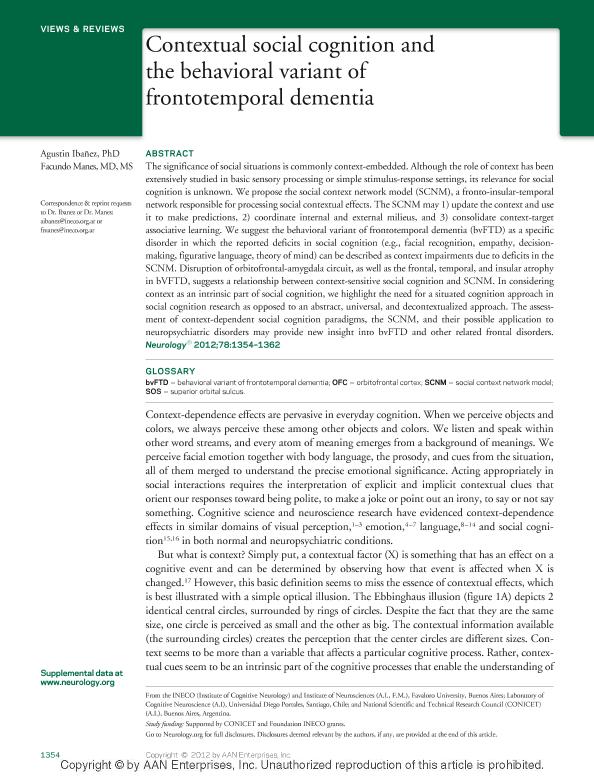Artículo
Contextual social cognition and the behavioral variant of frontotemporal dementia
Fecha de publicación:
06/2012
Editorial:
Lippincott Williams
Revista:
Neurology
ISSN:
0028-3878
Idioma:
Inglés
Tipo de recurso:
Artículo publicado
Clasificación temática:
Resumen
The significance of social situations is commonly context-embedded. Although the role of context has been extensively studied in basic sensory processing or simple stimulus-response settings, its relevance for social cognition is unknown. We propose the social context network model (SCNM), a fronto-insular-temporal network responsible for processing social contextual effects. The SCNM may 1) update the context and use it to make predictions, 2) coordinate internal and external milieus, and 3) consolidate context-target associative learning. We suggest the behavioral variant of frontotemporal dementia (bvFTD) as a specific disorder in which the reported deficits in social cognition (e.g., facial recognition, empathy, decisionmaking, figurative language, theory of mind) can be described as context impairments due to deficits in the SCNM. Disruption of orbitofrontal-amygdala circuit, as well as the frontal, temporal, and insular atrophy in bVFTD, suggests a relationship between context-sensitive social cognition and SCNM. In considering context as an intrinsic part of social cognition, we highlight the need for a situated cognition approach in social cognition research as opposed to an abstract, universal, and decontextualized approach. The assessment of context-dependent social cognition paradigms, the SCNM, and their possible application to neuropsychiatric disorders may provide new insight into bvFTD and other related frontal disorders.
Palabras clave:
CONTEXTUAL SOCIAL COGNITION
,
FRONTOTEMPORAL DEMENTIA
,
BEHAVIORAL VARIANT
Archivos asociados
Licencia
Identificadores
Colecciones
Articulos(SEDE CENTRAL)
Articulos de SEDE CENTRAL
Articulos de SEDE CENTRAL
Citación
Ibañez, Agustin Mariano; Manes, Facundo Francisco; Contextual social cognition and the behavioral variant of frontotemporal dementia; Lippincott Williams; Neurology; 78; 17; 6-2012; 1354-1362
Compartir
Altmétricas




